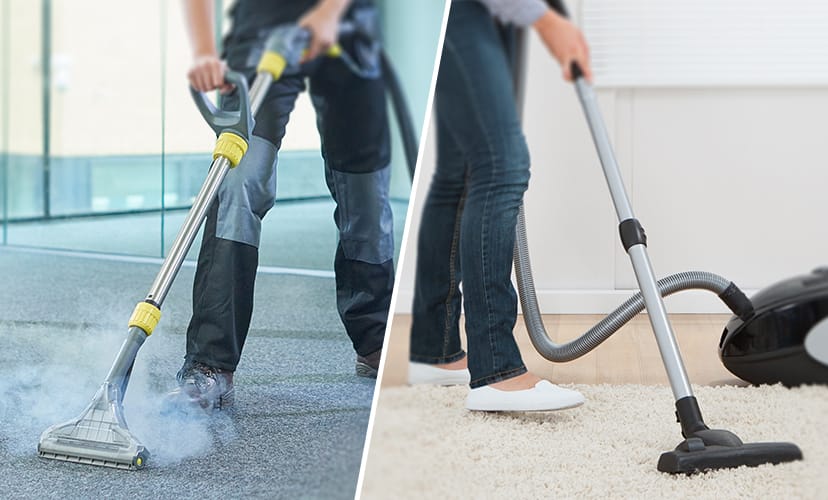When it comes to the world of cleaning, there are two distinct service types available: commercial cleaning and residential cleaning. There are a few key differences that make the two cleaning options appropriate for different buildings and cleaning needs. The most obvious difference is the facility type, including sanitary requirements and use schedules which dictate when a commercial cleaning company is needed over a residential one; but there are other differences. This blog will discuss and dissect commercial and residential cleaning services, and the context in which each is most appropriate.

What Is Commercial Cleaning?
Commercial cleaning is cleaning carried out by a commercial cleaning company: an organization that employs trained cleaners who use specialized technology to sanitize commercial buildings, such as:
- Offices
- Cleanrooms and R&D Facilities
- Medical and Healthcare Facilities
- Schools
- Commercial Kitchens
- Industrial
Commercial cleaning organizations consist of teams of specialists that use specialized cleaning technologies and tactics to guarantee optimal hygienic conditions, and to adhere to the most stringent requirements when extreme remediation or cleanroom development conditions need to be considered.
Technology is also a big part of what commercial cleaning companies bring to the table. Some companies offer electrostatic spray disinfection, which is a tool used to apply disinfectants, mold preventatives and sanitizers to 3D surfaces for a 360-degree complete clean.
Some commercial cleaning companies use environmentally friendly products and green cleaning techniques during their routines. Green cleaning technologies and chemicals not only reduce environmental impact but prevent negative effects on the people who frequent the buildings.
Commercial cleaning companies are also bonded and insured, meaning that damage done during a job or theft that occurs while a job is being carried out will be covered for the customer in some capacity.
Essentially, a commercial cleaner should be used for commercial or specialty facilities that require advanced knowledge, training and technology to effectively deep clean environments that require it for the safety of their staff and visitors.
What Is Residential Cleaning?
A residential cleaner is often exactly what the name implies: cleaners for homes or other domestic dwellings. However, training, technology and processes are all widely dependent on the provider or individual and vary greatly from case to case. Residential cleaners can either be part of a larger company or can be self-employed individuals. Because of this discrepancy in uniformity, some residential cleaners can leave a lot to be desired when it comes to effective cleaning techniques.
Many residential cleaners are left to their own devices when it comes to choosing and using cleaning supplies and technology, which can result in harmful or harsh chemicals being employed instead of green alternatives.
Additionally, the quality of the cleaning can differ largely from residential cleaner to residential cleaner, with outdated technology and a lack of training largely affecting the quality of the cleaning that a residential cleaner will carry out.
Another large difference is the insured or bonded status of residential cleaners. For an individual or residential cleaning organization, insurance is not required. This means that the cost to repair property damage will have to be paid back by the individual cleaner, or at worst, out of the owner’s pocket.
Decisions, Decisions
The main difference between commercial cleaners and residential cleaners is the facilities that they’re most qualified to clean. Commercial cleaners excel at cleaning specialty areas, such as cleanrooms, medical facilities and industrial facilities, while residential cleaners are more apt for homes and other similar domestic dwellings.
The difference is also apparent when it comes to the effectiveness of the cleaning. Commercial cleaners employ trained technicians who use top-of-the-line technology to deliver rigorous cleaning that satisfies rigid standards, while residential cleaners often operate to their own, or their client’s, standards.
Last, but perhaps most important, is the fact that most commercial cleaners are bonded and insured, meaning, any damage or theft that happens during their cleaning routine is protected. A residential cleaner may not have insurance at all, meaning that expenses amassed by damaged property or theft are going to be paid back by the cleaner, or run the risk of falling onto the client’s shoulders.
Consider these differences when choosing a commercial cleaning company versus a residential cleaning company, and ask yourself: what type of facility am I hiring them for? And what matters most to me: cost; cleanliness; dependability; green cleaning? The good news is, with us, you don’t have to decide.
If you need the assistance of a commercial cleaning company in guaranteeing the cleanliness of your cleanroom, medical facility or industrial facility, contact us today.


6 thoughts on “Commercial Cleaning vs. Residential Cleaning: What’s the Difference?”
Comments are closed.